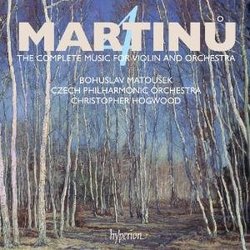Splendid violin concertos from the elegant Martinu
R. Hutchinson | a world ruled by fossil fuels and fossil minds | 01/29/2010
(5 out of 5 stars)
"These violin concertos are typically elegant works by the great Czech composer Bohuslav Martinu. Thanks to Hyperion for its series the Complete Music for Violin and Orchestra by Martinu, of which this is the fourth and final volume. These concertos were recorded in 2001 and 2004 by violinist Bohuslav Matousek and the Czech Philharmonic, led by Christopher Hogwood. The performances, recordings and packaging are all outstanding.
Martinu's "Concerto for Violin, No. 2 (29'07 -- 1943) was thought to be his only violin concerto for many years. Then an earlier concerto from 1933 was discovered. It had never been performed, and was lost when Martinu fled to the U.S. just ahead of the Nazi occupation of France. The "Concerto for Violin, No. 1 (25'01 -- 1933) was only finally premiered in 1973 by Joseph Suk with Georg Solti leading the Chicago Symphony Orchestra. This earlier work is full of energy and folk music influences, definitely pointing up the similiarities to Bartok, who was born in 1890, the same year as Martinu. The structure is three movements, fast-slow-fast, and Martinu's characteristic rhythmic vitality is strong. The violin is pitted against a series of small instrumental groups in various combinations. The finale is light and buyant. This is a piece that I tend to want to hear again as soon as it ends. It reflects the exuberant Modernism and jazz influence of the 1920s, but also neoclassicism, incorporating counterpoint and polyphony based on intensive study of Bach.
The Second Concerto, which had a 30-year public career before the First Concerto was discovered, is a broader, more Romantic piece, again with a fast-slow-fast structure, though the first movement is itself divided into a slow-fast-slow arc. Passages sound very Western Americana to me in that classic Copland style that might be used as a "Bonanza" soundtrack. Martinu wrote the piece at the request of violinist Mischa Elman, who premiered it in December of 1943. According to the liner notes, "[t]he work's main characteristics recall the qualities of Elman's playing, notably his unique sound, his preference for noble and elegant melodies, his exceptional feeling for the sonority of his instrument, his love of slow tempos, and his rich use of rubato and portamento." While I prefer the First Concerto, this is another fine work and Matousek has a light, singing tone that is an absolute pleasure to hear. There are 7 performances of the Second Concerto available at the moment, and only 2 permances of the First Concerto, so it clearly has a greater presence in the performing repertoire. The only other recording of the First Concerto is the earlier Czech Philharmonic recording with Joseph Suk on violin (grandson of the composer).
Martinu (1890-1959) was himself a violinist, who played with the Czech Philharmonic for a time, and this is reflected in his beautiful writing for violin. I don't know what he was like in person, but Martinu's music is nearly always sunny and bright, elegant and light. Though he came from a humble background, one might think from his music that he was an aristocrat, and I mean that in the best possible way, indicating a disposition to enjoy the finest life has to offer with an easy joi de vivre. This is music that will improve your mood! Martinu studied with Joseph Suk, and then Albert Roussel in France, who was a decisive influence on Martinu's rhythmic energy.
I have only recently discovered Martinu, who seems to occupy a second tier of composers among his contemporaries. He may not have been as innovative as Bartok or Stravinsky, but based on the quality of his music that I have heard thus far, Martinu had a distinctive, compelling voice and deserves to be held in equally high esteem.
I look forward to hearing more Martinu, and in particular more from this superb Hyperion series!
(verified purchase from ArkivMusic)"

